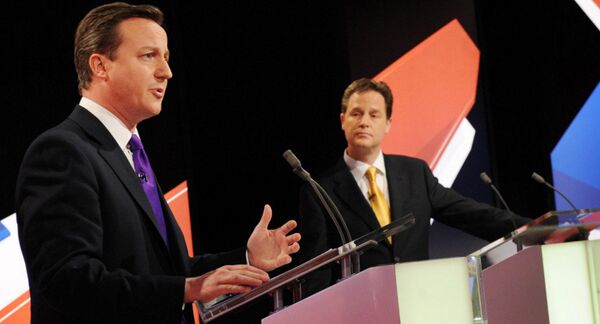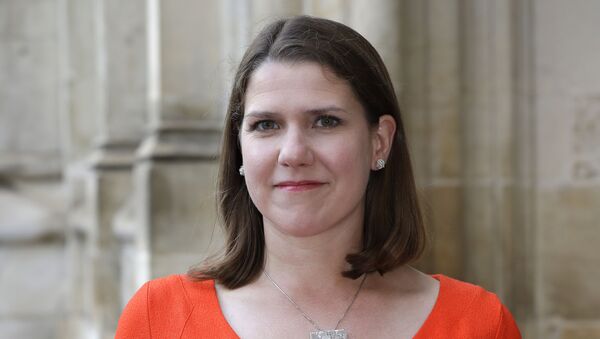Liberal Democrat leader Jo Swinson ruled out entering into a coalition with either Labour or the Conservatives on Monday, 16 September, saying neither Boris Johnson nor Jeremy Corbyn was "fit to be our prime minister."
But the 39-year-old, who only took over as the Liberal Democrats’ leader in July, will almost certainly live to regret her remarks.
In February 2010 the then leader of the Liberal Democrats, Nick Clegg, ruled out going into coalition with Gordon Brown or David Cameron.
Busy day at the Lib Dem conference so Jo Swinson and the MPs(left of photo) are on Bournemouth beach. Trust the Labour recruit Angela “funny tinge” Smith slapped on the sun block pic.twitter.com/s7Zi6QbICH
— Kevin Maguire (@Kevin_Maguire) September 17, 2019
Three months later Clegg became Deputy Prime Minister as part of a behind-closed-doors deal with the Tories in which Mr Cameron agreed to hold a referendum on proportional representation.

Clegg had earlier said: “I'm not a kingmaker ... The people are the kingmakers."
But the 2010-2015 coalition was to be a complete disaster for the Lib Dems who had long complained that Britain’s “first past the post” electoral system gives them fewer MPs than their share of the vote.
Jo Swinson lumps Corbyn with Boris & Farage as populist & nationalist. Corbyn has been accused of being a 'Russian spy', 'traitor', 'terrorist-sympathiser', 'Marxist', & 'antisemite' & now he's a 'nationalist'. Their contradictions in slurs are getting more creative every day 😂
— Jill Gore (@JillGore8) September 17, 2019
The Tories, and most Labour MPs, came out in complete opposition to the Alternate Vote system which was proposed to replace First Past The Post.
In the May 2011 referendum 67.9 percent of those who voters rejected AV and with it went the Lib Dems chances of getting more MPs.
"People are flocking to the Liberal Democrats. We are becoming that rallying point for liberal values and becoming a wider movement that can actually turn them into reality" - @joswinson
— Liberal Democrats (@LibDems) September 16, 2019
Join our growing movement 👇🔶https://t.co/xOHtAN8CQ2 pic.twitter.com/xL9V0R4PMq
But Mr Clegg also betrayed a key promise of his manifesto - that he would not increase university fees - and he was tarnished with the brush of austerity as Tory-led cuts hit voters hard.
True.
— Tom London (@TomLondon6) September 16, 2019
Nick Clegg and Lib Dems were calling for an “in or out of the EU Referendum” even before Cameron proposed it.
Someone should ask Jo Swinson about this. https://t.co/bbEiGrRhV5
In the 2015 general election voters punished the Lib Dems heavily and they lost 49 seats to the Tories, Labour and the SNP.
Mr Clegg quit and was replaced by Tim Farron but he struggled to make inroads - gaining only four seats in the 2017 election - and was substituted by Vince Cable, the 76-year-old veteran who had been Business Secretary in the coalition.
As a former MEP and party leader, just fantastic to see @LibDems back in force in Europe. Great for the party, for liberals everywhere - and for the EU too.
— Nick Clegg (@nick_clegg) May 27, 2019
Swinson beat Ed Davey in the Lib Dem leadership contest in the summer and is now surfing a wave of optimism in the party, which is holding its annual conference in Bournemouth.
The Lib Dems did well in the European election earlier this year and are increasingly positioning themselves as the party for Remainers.
Labour fears losing dozens of seats to the Lib Dems in London and other Remainer strongholds.
On Monday the Lib Dem conference voted to cancel Brexit altogether and revoke Article 50 if they enter government with a majority.
She's wrecked it!
— Rebecca Fewtrell (@RFewtrellUK) September 15, 2019
Lib Dems simply DO NOT understand their vote base.
Under Kennedy & Clegg, Labour voters thought it was safe to vote Lib dem tactically. If LDs were so popular why did their vote collapse after coalition, at GE15?
This helps labour. Not LDs. pic.twitter.com/S11KieI3u5
But the likelihood of that happening is remote as the Lib Dems currently only have 12 seats and would need to win around 300 to take power.
If Boris Johnson is able to increase his majority he could go into government on his own, like David Cameron did in 2015. Or he could cobble together another working arrangement with the Democratic Unionist Party, whose 10 MPs propped up Theresa May between the 2017 election and her demise.
But another possibility is that the Lib Dems will grab up to 80 seats from Labour and the Tories, particularly in southern and western England, and make themselves once again “kingmakers”.
In that event Ms Swinson will have to swallow her words and enter into coalition negotiations with Mr Johnson or Mr Corbyn.
But what would the Lib Dems demand this time - like Mr Clegg demanded an Alternative Vote referendum - in order to put the Tories or Labour back in 10 Downing Street?
Jo Swinson has gone full lying Tory.
— Bevan Boy🌹 (@mac123_m) September 16, 2019
From 100% People's vote to Revoke Article 50 in a matter of weeks.
She also has never ruled out a coalition with the Tories!
You cannot trust a word Jo Swinson says. I wonder what Lib Dem voters & #FBPE think? #JoSwinsonIsATory pic.twitter.com/mTdwI0S9sg
What form would their thirty pieces of silver take?
One option would for them to demand the Prime Minister - whoever it be - pass legislation which would abolish the first-past-the-post system and give the Lib Dems a form of proportional representation.
But that would look extremely anti-democratic when a referendum only eight years ago rejected it by a two-thirds majority.
Jo Swinson has the weirdest accent. It's not plain posh Scottish (see Ruth Davidson), but instead glides between that and something almost approaching Estuary English, and her vowels are all over the place. Is it a poorly attempted affectation or does she really sound like that?
— Pádraig Durnin (@padraigfd) September 17, 2019
Another obvious bargaining chip would be Brexit itself.
The Lib Dems could demand their coalition partners revoke Article 50 and keep Britain in the European Union.
When she took over as leader, Ms Swinson said in her first speech: “We believe the UK’s best future is as members of the European Union, and that’s why, as your leader, I will do whatever it takes to Stop Brexit.”
This would be virtually impossible for the Tories to stomach and even Jeremy Corbyn would fear such a deal would tear Labour apart, such is the strength of support for Brexit in the north of England, Wales and parts of the Midlands.
So what else might the Lib Dems demand in return for their support for a coalition?
In 2017 a key part of their election manifesto was putting 1p in the pound on income tax to raise an extra £6 billion a year for the NHS and adult social care.
Raising taxes would not go down well with the Tories but it might be a more palatable option and would at least help to solve the ongoing NHS funding crisis.
Jo Swinson and Luciana Berger rehearsing for Bournemouth Wives, the Liberal Democrat Amateur Dramatic Society's remake of the Stepford Wives.pic.twitter.com/rtpzMxk2hF
— Chuka Umunna's Flip Flops (@WarmongerHodges) September 17, 2019
Ms Swinson would probably also try to drive a harder bargain than Mr Clegg when it came to ministerial positions around the Cabinet table.
In 2010 the Lib Dems were given only the Business Secretary and Energy Secretary posts, on top of Mr Clegg’s role as Deputy Leader and Danny Alexander’s fairly pointless job as Scotland Secretary.
This time round Ms Swinson would probably demand at least one of the top jobs - Home Secretary, Foreign Secretary or Chancellor - and also try to get a minister in the Department of Health.


